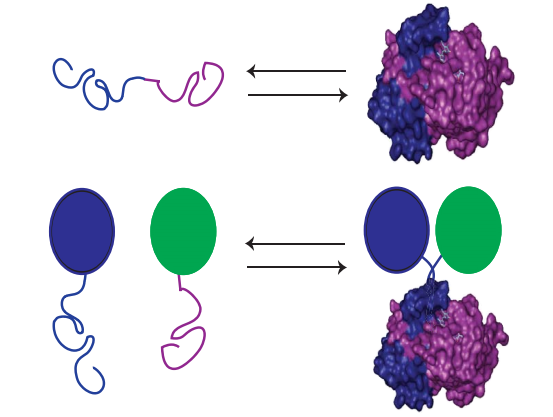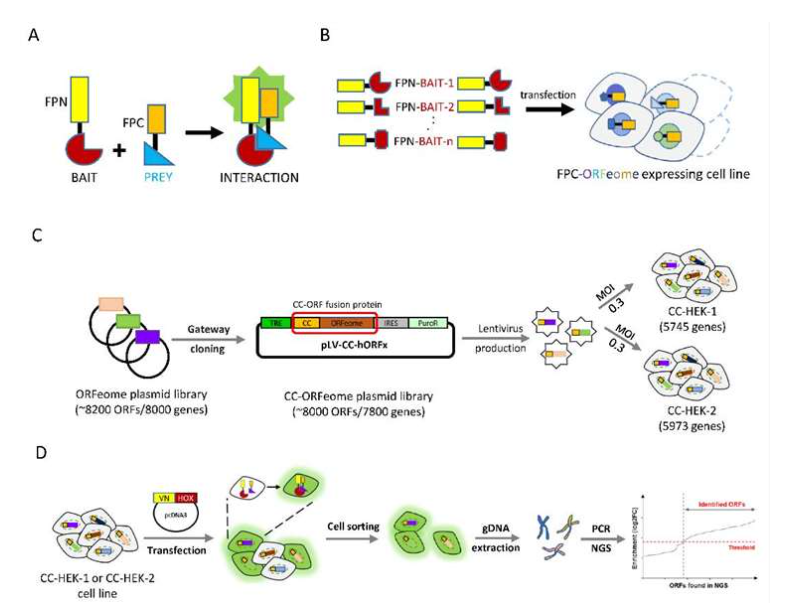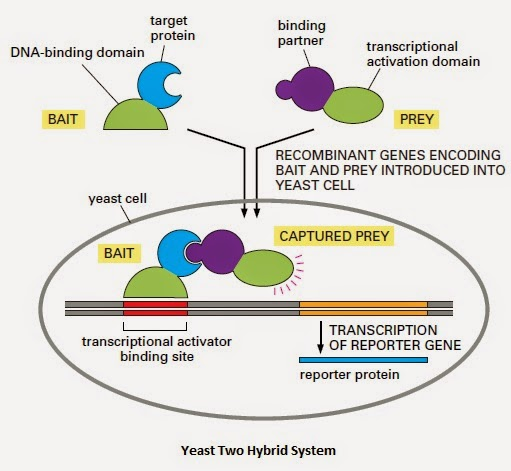Protein Fragment Complementation Assay Service
Protein Fragment Complementation Assay (PCA) is a technique used to detect protein-protein interactions (PPIs), providing a straightforward experimental approach for studying PPIs in live cells, multicellular organisms, or in vitro environments. The protein fragment complementation assay service works by dividing a protein into multiple fragments and fusing these fragments with a reporter gene. When these fragments come into close proximity and reassemble into a complete protein, the reporter gene is activated, enabling the detection of PPIs. The protein fragment complementation assay service offered by MtoZ Biolabs can be utilized to detect proteins expressed at endogenous levels with proper post-translational modifications in the appropriate subcellular compartments of any cell type or organism under any condition. In protein fragment complementation assay strategies, protein-protein interactions (PPIs) are measured by fusing each protein of interest to either the N-terminal or C-terminal peptide of a reporter protein, which has been rationally dissected using protein engineering approaches. The target protein fragments are brought into proximity through the interaction between the two interacting proteins, allowing them to fold together into the three-dimensional structure of the reporter protein, thereby reconstituting the activity of the target protein (Figure 1).

Figure 1. Schematic Diagram of Protein Fragment Complementation Assays Experiment.
Service Advantages
1. Advanced Analytical Platform
MtoZ Biolabs has established a protein fragment complementation assay service platform, offering a comprehensive end-to-end workflow, including kit-based solutions, high-throughput sample preparation, automated micro-scale fractionation, high-performance mass spectrometry acquisition, and specialized data analysis and quality control platforms. These ensure reliable, rapid, and high-precision services.
2. Rigorous and Accurate Data
A strictly standardized detection process is implemented, ensuring meticulous execution at every stage, from sample collection to data analysis, guaranteeing accurate and reliable results.
3. Transparent Pricing
Our pricing is transparent, with no hidden or additional fees.
4. High-Quality After-Sales Support
From the signing contract to the collection, the start of the experiment to the completion of the report, and the report of the report within three years, there are any questions about the report or experimental data, the after-sales service is 24 hours online, and any problems related to the project are solved at any time.
5. Independent and Impartial Approach
MtoZ Biolabs strictly adheres to legal regulations and industry standards, ensuring objective and unbiased detection results, free from external influence.
Applications
1. Cell Biology
Protein fragment complementation assay service is extensively applied in cell biology research, where the complexity of underlying mechanisms necessitates multifaceted approaches. One of the key research areas involves signal transduction pathways, which are intricately interconnected with numerous biological processes, including cell growth, differentiation, and apoptosis. By leveraging PCA, researchers can explore protein-protein interactions (PPIs) within these pathways, uncover their underlying mechanisms, and identify potential drug targets.
2. Enzyme Regulation
Protein fragment complementation assays are a crucial tool in enzyme regulation studies. Many enzymes are regulated through interactions with other proteins, and dysregulation of these interactions can lead to severe pathologies, including cancer and metabolic disorders. Using PCA, researchers can precisely identify proteins involved in enzyme interactions, gaining valuable insights into enzyme regulatory mechanisms and paving the way for the development of novel therapeutic strategies for debilitating diseases.
3. Small Molecule Screening
The protein fragment complementation assay service is also utilized for small molecule screening, assessing their ability to disrupt protein-protein interactions in cellular biology. This pioneering approach has led to numerous groundbreaking discoveries, facilitating the identification of small molecules that can interfere with PPIs associated with various pathologies, including but not limited to cancer and Alzheimer's disease. Consequently, this method undoubtedly provides a valuable platform for the development of innovative therapeutic strategies.

Jia, Y L. et al. Cells, 2023.
Figure 2. Application of Protein Fragment Complementation Assay (PCA).
Case Study
Yeast Two-Hybrid System (Y2H): The yeast two-hybrid (Y2H) system utilizes two separate structural domains of a eukaryotic transcription activator: the DNA-binding domain (BD) and the transcription activation domain (AD). Transcription occurs normally only when these two domains function together. In the Y2H system, the "bait" protein and the "prey" protein are respectively fused with AD and BD to form two fusion proteins. If these two proteins interact within yeast cells, AD and BD will come into close spatial proximity, thereby reconstructing a functional transcription activator and activating the expression of a reporter gene. The Y2H system enables rapid and direct analysis of interactions between known proteins and facilitates the identification and isolation of ligands that interact with known proteins. It has wide applications in studying antigen-antibody interactions, discovering novel proteins and new protein functions, screening drug targets and evaluating drug effects on protein interactions, as well as constructing genome-wide protein interaction networks.

www.technologyinscience.blogspot.com
Figure 3. The Yeast Two-Hybrid (Y2H) System.
Deliverables
1. Experimental Procedures
2. Relevant Mass Spectrometry Parameters
3. Mass Spectrometry Images
4. Raw Data Files
5. Protein Differential Level Analysis
6. Bioinformatics Analysis
Note: If you have any special requirements or personalized data analysis requests, please contact us.
MtoZ Biolabs is a comprehensive provider of spectroscopic and mass spectrometry (MS) services, leveraging its seven in-house analytical platforms: Biopharmaceutical Physicochemical Analysis Platform, Biopharmaceutical Structural Characterization Platform, Immunopeptidomics and Immunological Analysis Platform, Single-Cell Analysis Platform, Proteomics and Metabolomics Analysis Platform, Protein Sequencing Platform, and Data Cloud Platform. We are dedicated to offering one-stop proteomics, metabolomics, and biopharmaceutical analysis services to scientific research institutions, as well as diagnostics and pharmaceutical enterprises.
MtoZ Biolabs, an integrated chromatography and mass spectrometry (MS) services provider.
Related Services
Protein-Protein Interaction Analysis Service
MS-Based Protein-Protein Interaction Analysis Service
Fusion Protein Interaction Analysis Service | Pull-Down and MS
How to order?







